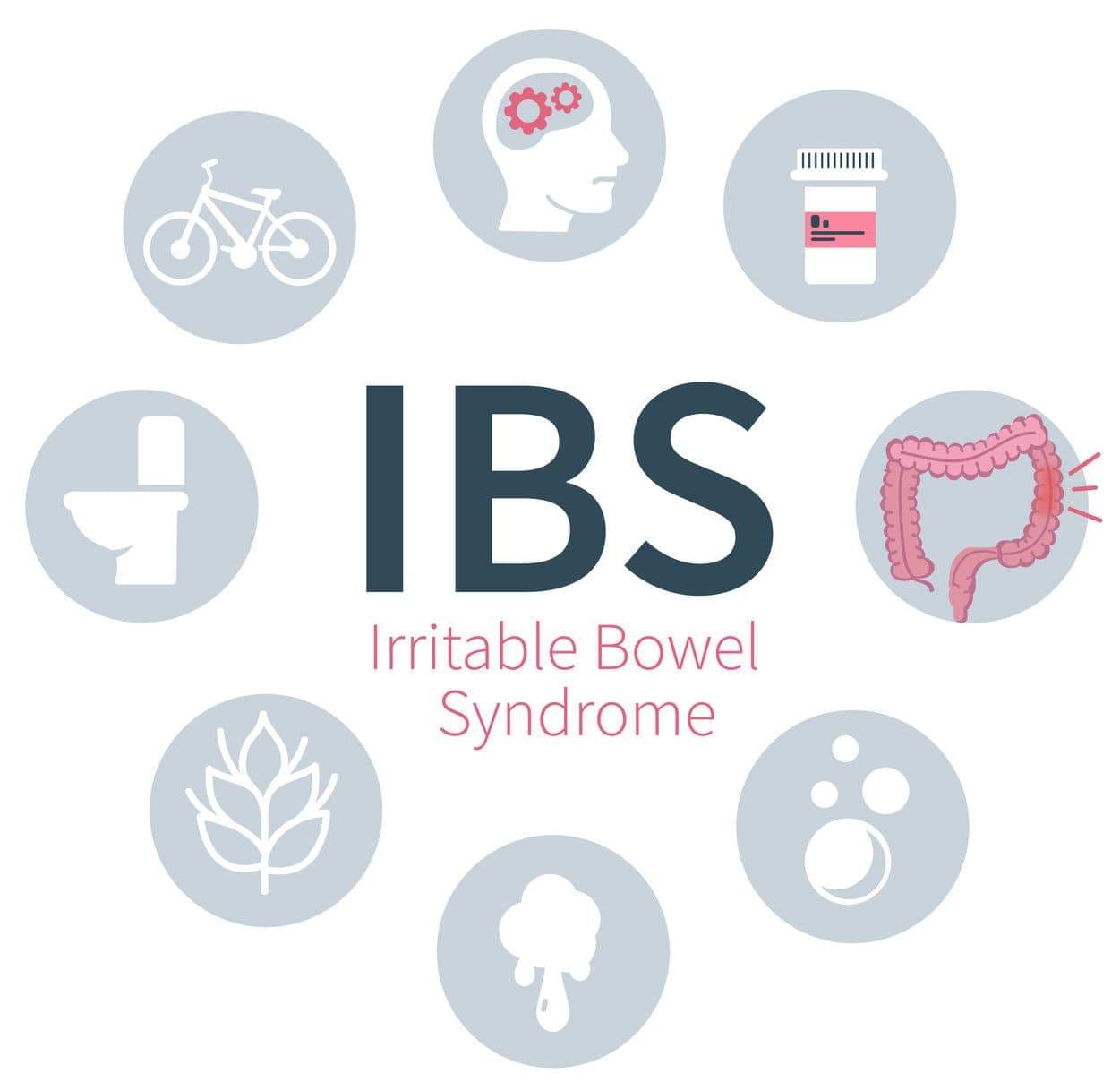
With a prevalence of 10-20% worldwide, irritable bowel syndrome (IBS) is an exceedingly common digestive disorder characterized by abdominal pain and distension, changes in bowel habits (constipation, diarrhea, or both), and is usually a long-term affliction.1 In order for a diagnosis to be made, the symptoms must be present for at least six months, occurring at least once per week.2
What Causes IBS Symptoms?
IBS is part of a category of digestive disorders known as functional gastrointestinal disorders (FGDI), which means that a clear pathology cannot necessarily be determined, even though the patient may be quite ill. It is a syndrome with a certain constellation of symptoms common to sufferers, but a diagnosable, named disease cannot be determined, e.g. celiac disease, inflammatory bowel diseases such as Crohn’s or ulcerative colitis. Because of this, IBS has historically been considered a “disease of exclusion”, meaning that an organic cause cannot be found through lab work or imaging, and that the diagnosis is made after all other causes have been ruled out.
Conventional medical care may be inadequate for these patients because a definitive cause cannot be determined. A handful of drugs are currently on the market to help alleviate symptoms, but they do not address the root cause in the way that naturopathic medicine can. 3, 4

Mechanisms
Until more conclusive diagnostic testing can be developed, common features, aside from symptoms, have been observed in IBS patients which give insight into the underlying cause of the syndrome. Understanding the mechanisms behind a health concern is an ND’s first step toward effective treatment and hopefully, cure.
- Low grade inflammation of the gut has been implicated in IBS, not to be confused with irritable bowel diseases. Inflammatory cells of the intestinal lining have been detected in IBS patients, and they have an increase in inflammatory markers called cytokines in both the blood and lining of the colon. 5
- Histamine, which we typically think of for allergic reaction is also produced in the gut and is thought to contribute to the “visceral hypersensitivity” of IBS patients. 6
- Post-infection IBS is the development of IBS in the aftermath of an intestinal infection that can last long after the infection itself resolves. This is thought to create abnormal gastrointestinal motility and increased contractility of the smooth muscle, perhaps due to inflammatory processes.7

IBS Triggers
- Food sensitives/intolerance – When it comes to IBS, food plays a central role in that many people with IBS note significant association between the foods they eat and the appearance or exacerbation of their symptoms. Inflammation of the gut lining may be a common result of food sensitives/intolerance, which may trigger IBS.
- Dysbiosis – A characteristic of IBS appears to be a reduction in the diversity of the gut microbiome. One study showed that those patients with the most severe symptoms had fewer different strains of gut flora than of those with milder cases or healthy control. 8
- Stress – The gut-brain connection appears to be particularly important in the development of IBS, and many cases of IBS began with a traumatic life event. 9
- Hormones – Because women tend to develop IBS more often than men, female sex hormones are thought to play a role. In fact, estrogen dysregulation has been shown to create an immune response in the gut, contributing to the symptomology. 10
NDs share IBS patient success stories

Homeopathic podophyllum provided immediate relief for the explosive, urgent diarrhea which allowed her to feel more comfortable leaving the house. Further work revealed issues with GI dysbiosis and pancreatic insufficiency. After a few different herbal and pharmaceutical treatments to correct the dysbiosis, discovering the right pancreatic enzyme and focusing on stress reduction/sleep improvement, one year later she is having one-two non-urgent, well-formed stools per day while maintaining a healthy diet.”


Graduate, Bastyr University
“A female in her mid-40s presented with a six-month history of abdominal pain, loose stools and nausea. Her symptoms started around the same time that the she had undergone significant stress with work and family. She was diagnosed with IBS-D and recommended to take Imodium as needed for the loose stool and to reduce stress. She did this, however the symptoms never really resolved which brought her in to see me. I gave her a gut healing protocol with glutamine, herbs and digestive enzymes which helped a little, but also did not resolve her symptoms. It became clear that her symptoms were worse with some meals so we investigated food intolerances and found that she reacted to wheat, dairy and eggs. She eliminated these from her diet and her symptoms improved slightly more, but not completely. At this I ordered a small intestinal bacterial overgrowth (SIBO) breath test, which was positive. Of note, the only risk factor she had for SIBO was stress. I treated her SIBO and all her GI symptoms resolved. While she still had mild reactions to wheat, dairy and tomatoes, she was able to tolerate them much better after SIBO treatment.
Depending on the study, somewhere between around 60-80% of patients with IBS test positive for SIBO. This may be what is causing all their digestive symptoms and, in my opinion, is important to consider when determining treatment approaches. If SIBO is present, it is the first thing I work. If SIBO is missed, you won’t generally get very far with the IBS treatment until it is addressed.”

She left hopeful for the first time in years. A month later she reported having had solid bowel movements consistently through the weeks, and significant improvement in gas and bloating. She was sleeping better and hadn’t had a headache since the second week. She even found the energy to start an exercise routine. She had seen the immediate effect from removing offending foods, and using enzymes and probiotics, and found it was worth the effort. At six months she was thriving for the first time in decades and had become a vocal advocate for gut health. She even led a meditation group for her stress-filled office in an effort to improve her surroundings.”
Due to the complexities of IBS and the intricacies of the workings of the human digestive tract, a single treatment is unlikely to be fully beneficial for managing IBS symptoms effectively. Using a multi-pronged approach that takes advantage of the various approaches available is more likely to result in adequate symptomatic control and management of the condition long term.
For questions about how naturopathic doctors treat patients with conditions like IBS, click here to find an ND near you in the United States or Canada. The Gastroenterology Association of Naturopathic Physicians (GastroANP) is also a great resource!








